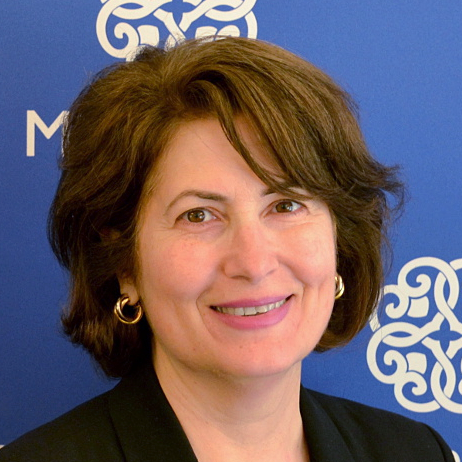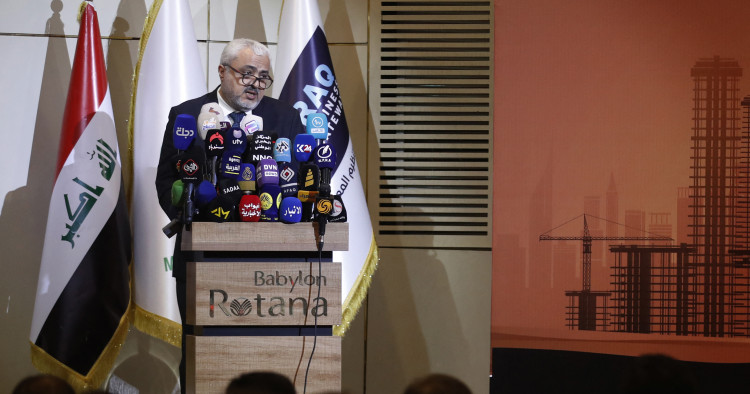Contents:
- Iraq passes a massive, controversial budget bill
- Israeli officials embraced in Morocco, as Israel considers changing policy toward Western Sahara
- UAE secures presidency of World Meteorological Organization, leading up to COP28
Iraq passes a massive, controversial budget bill
Randa Slim
Senior Fellow and Director of Conflict Resolution and Track II Dialogues Program

-
The record $153 billion budget bill was facilitated by an earlier deal between Baghdad and Erbil that gives the federal government the power to monitor and audit the KRG’s oil and gas income.
-
The budget bill reflects the politically short-termist mentality of the ruling State Administration Coalition as well as the staying power and political influence of Iraq’s militias.
After a three-month delay, following the Iraqi Council of Ministers’ approval of the federal budget bill on March 13, the Iraqi parliament finally passed this critical legislation on June 11. The record $153 billion budget is based on a price of $70 per barrel and total Iraqi daily exports of 3.5 million barrels of oil (bpd), including 400,000 bpd of exports from the Kurdistan Regional Government (KRG). The budget bill remains valid through 2025 but will be subject to amendments in the following two years to take into consideration potential changes in global oil prices.
Agreement on the budget bill was facilitated by a deal between Baghdad and Erbil that handed the central government the power to monitor and audit the KRG’s income from its oil and natural gas resources. This accord, in turn, came out following the International Chamber of Commerce’s (ICC) ruling last March in favor of the Government of Iraq in its nine-year arbitration case against Turkey over KRG exports to Iraq. In particular, the ICC’s decision gave the coup de grace to the KRG’s independent production and export of its oil and gas.
There are three important takeaways from the just-adopted budget bill:
First, it reflects the short-termist mentality of the de facto governing party of Iraq, the State Administration Coalition (SAC), of which Iraqi Prime Minister Mohammed Shia’ al-Sudani is a member. The budget aims to buy time and patience from Iraqi voters by adding hundreds of thousands full-time and temporary staff and contractors to the public sector, thereby increasing public wage spending, including salaries and pensions, by $58 billion — running counter to recommendations by the International Monetary Fund and many Iraqi economists who have been calling for a tighter fiscal policy. As one economist told this author last month in Baghdad, this is a “public employment budget” and not an “investment budget.” Out of the $153 billion, only $37.9 billion is reserved for investments, including infrastructure projects.
Second, the budget reflects the staying power of the Popular Mobilization Forces (PMF). Namely, the bill includes a major expansion of PMF personnel, though it is not clear yet by how much. Reported estimates span the range of a 20-95% increase in the PMF ranks from the last reported figure of 170,000 in the 2021 budget. It is worth comparing that to the more modest reported increases in the Ministry of Defense (6%) and Ministry of Interior personnel (3%). The PMF militant groups are essential players in furthering the SAC’s agenda to consolidate power and long-term control over Iraqi politics.
And finally, it is not clear yet how the passage of the budget bill — or the intra-SAC negotiations with the two main Kurdish parties leading up to it — facilitates or hinders the Iraqi prime minister’s promise to pass a federal oil and gas law during his term. The same feat had also eluded his predecessors. In the past, bargaining dynamics between Baghdad and Erbil over the control of KRG hydrocarbon resources, which favored Erbil, stood as an obstacle to such a law’s passage. It was not in Erbil’s interest at the time to hand over to Baghdad control of production, export, and financial management of its hydrocarbon resources. Yet since the March ICC ruling, which itself was preceded by Iraq’s Federal Supreme Court ruling in 2022 on the unconstitutionality of the KRG’s oil and gas law, the power dynamics have shifted in favor of Baghdad. The more recent negotiations leading to the passage of the budget bill reflected this change. Going forward, the challenges facing Prime Minister Sudani in getting a federal oil and gas law passed will lie not only with the KRG but with other regional oil-producing governorates that are seeking to strike their own hydrocarbon revenue-sharing deals with Baghdad.
Follow on Twitter: @rmslim
Israeli officials embraced in Morocco, as Israel considers changing policy toward Western Sahara
Nimrod Goren
Senior Fellow for Israeli Affairs

-
In contrast to Israel’s slowing ties with other Arab countries, Morocco has hosted four Israeli high-level visits since early May, after zero such visits in previous months since Netanyahu’s government had come to power.
-
These meetings serve as a diplomatic boost for Netanyahu and may derive from a Moroccan expectation that Israel will soon recognize Rabat’s sovereignty over the Western Sahara.
Until a month ago, Morocco’s relations with the new Israeli government were on a similar trajectory to those of other Arab countries that maintain diplomatic ties with Israel: an obvious slow-down compared to the tempo under Israel’s previous government, led by Naftali Bennett and Yair Lapid. After Benjamin Netanyahu’s hard-right cabinet took power on Dec. 29, 2022, Israeli-Moroccan ministerial meetings rarely took place; and when they did, they occurred in multilateral settings. Previous bilateral agreements held, but they were advanced slowly, and only a few new cooperative endeavors were announced as of the start of the year. The Negev Forum’s ministerial summit — originally planned to be held in Morocco in March — was postponed, without a new date set.
Yet since early May, there has been a clear shift. Israeli officials began to visit Morocco one after the other, each time warmly welcomed and embraced by their counterparts. First, it was Economy Minister Nir Barkat, who attended the Salon International de l’Agriculture au Maroc (SIAM) agricultural exhibition. He met with Morocco’s Agriculture Minister Mohamed Sadiki and discussed increased ties in the water, desert, and marine agriculture fields. Transportation Minister Miri Regev followed suit, arriving at the end of the month for a bilateral ministerial meeting and the signing of three transportation agreements. Next to travel to the North African kingdom was Knesset Speaker Amir Ohana. He met with his Moroccan counterpart, Rachid Talbi El Alami, delivered a warm message of friendship, and signed an agreement on inter-parliamentary cooperation. The last such visit (to date) was by National Security Advisor Tzachi Hanegbi, who met with Morocco’s Foreign Minister Nasser Bourita and the heads of the country’s security services on strengthening bilateral cooperation in foreign and security affairs.
For Prime Minister Netanyahu, these developments are a blessing. They serve Netanyahu’s current efforts to improve his domestic and international image, which had been deteriorating for months, following his and his cabinet’s problematic conduct. Morocco’s opening enables Netanyahu to try to counter claims — heard from within Israel but also from senior Arab sources — about the damage his government has done to Israel’s regional ties.
But what is driving Morocco? A possible explanation could be found in statements made by Knesset Speaker Ohana while he was in Rabat about Netanyahu potentially readying to recognize Morocco’s sovereignty over the Western Sahara. This possibility also surfaced in the international media, coinciding with reported efforts to soon convene the Negev Forum’s ministerial summit, which Morocco previously intended — and perhaps still does — to host in the Western Sahara itself.
Securing international recognition of its sovereignty over the Western Sahara is a top foreign policy priority for Morocco. A guarantee of the United States’ recognition was notably a key factor in Morocco’s decision to normalize ties with Israel in 2020; and the heretofore continued lack of such Israeli recognition was often cited as the reason why Israel and Morocco still do not have embassy-level representations. The previous Bennett-Lapid government had occasionally indicated Israeli support for Morocco’s position but stopped short of official recognition, reportedly due to opposition from inside the professional bureaucracy. Traditionally, Israel has avoided taking stances on others’ disputed territories, to be better positioned to push back against international pressure regarding the Palestinian issue. This time, however, as Netanyahu urgently seeks a foreign policy achievement to bolster his personal status, recognition of Moroccan sovereignty over the Western Sahara looks more likely. Yet Israel’s state officials should make sure that any decision the political leadership makes is the right one for Israeli diplomacy and national interests and not merely a political lifeline for Netanyahu.
Follow on Twitter: @GorenNimrod
UAE secures presidency of World Meteorological Organization, leading up to COP28
Youssef Wehbe
Non-Resident Scholar, Climate and Water Program
Program Officer, Research Program for Rain Enhancement Science, UAE National Centre of Meteorology

-
The director general of the UAE’s National Centre of Meteorology was elected to head the World Meteorological Organization for a four-year term, from 2023 to 2027.
-
During the UAE’s tenure, average global temperatures are projected to exceed the warming constraint target of 1.5 degrees Celsius, bringing additional international scrutiny to COP28, being held in Dubai later this year.
The United Arab Emirates won the presidency of the World Meteorological Organization (WMO), which functions as an authoritative body on weather, climate, hydrological, and related environmental fields within the United Nations system.
On June 6, Abdulla al-Mandous, the director general of the UAE’s National Centre of Meteorology (NCM), was elected as the new president of the WMO for a four-year term, from 2023 to 2027. Dr. Mandous is the UAE’s permanent representative to the WMO and had heretofore served as the president of this international body’s 35-member Regional Association II (Asia).
This marks the first time that a Gulf Cooperation Council (GCC) and Arab meteorologist has been chosen to lead the WMO. He succeeds Prof. Gerhard Adrian of Germany, who has now completed his four-year term. The WMO president presides over sessions of the World Meteorological Congress and the Executive Council, which guides WMO activities in research and services related to weather, water, and climate. Additionally, the WMO president helps shape the global agenda for advancing weather and climate science; under Mandous’ guidance, this agenda can now be expected to more strongly take on climatological issues facing the Middle East and North Africa region. Primary challenges across MENA’s national weather services include infrastructure gaps in meteorological monitoring networks as well as unstructured data management and exchange frameworks.
The UAE is now leading two parallel international fronts for climate and meteorological policy and action — the WMO Presidency agenda and the hosting of the upcoming meeting of the U.N. Climate Change Conference (28th Conference of the Parties, COP28). And during this time, average global temperatures are expected to exceed the warming constraint target of 1.5 degrees Celsius, as projected and recently published by the WMO. Therefore, the Emirates’ tenure at the head of the world’s top meteorological and climate organization will bring further international scrutiny to the UAE’s efforts to derive actionable outcomes from the COP28 meeting in Dubai later this year.
Photo by AHMAD AL-RUBAYE/AFP via Getty Images
The Middle East Institute (MEI) is an independent, non-partisan, non-for-profit, educational organization. It does not engage in advocacy and its scholars’ opinions are their own. MEI welcomes financial donations, but retains sole editorial control over its work and its publications reflect only the authors’ views. For a listing of MEI donors, please click here.













